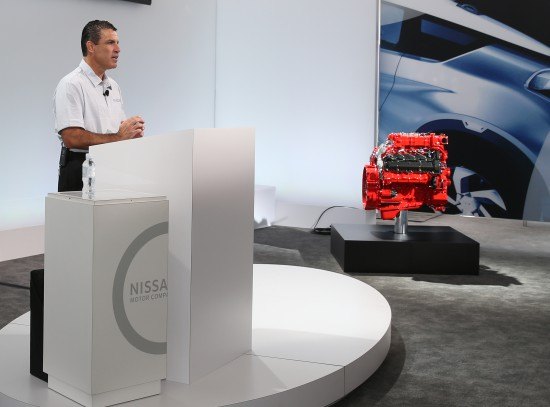Diaz Promises Profitable Share Gains, More Competitive Titan For Nissan
Nissan North America sales boss Fred Diaz expects his employer will gain more mind and market share in 2014 in the run-up to the 2016 Titan’s debut in showrooms, a truck promised to be more competitive than the current model.
Automotive News and WardsAuto report Nissan’s market share in 2013 nudged upward to 8 percent from 2012’s 7.9 percent share. Meanwhile, January 2014 sales rose 12 percent while overall industry sales fell 3 percent, and slashed sticker prices on a number of Nissan’s most popular models helped to to lower incentives by $375 while raising average transaction prices to $95 per unit sold.
Finally, Diaz himself met with the dealer advisory board monthly, as well as held discussions with all 1,167 dealerships in the United States, to learn about and adopt necessary product changes needed to bring more profits back to his employer.
One of the products in question is the 2016 Titan, where Diaz took those suggestions to heart during his visit to Nissan’s design studio in La Jolla, Calif.:
I was pleasantly surprised, but I also saw some things that could be improved significantly. No doubt I hurt some feelings and stepped on a few toes. I was pretty tough with the suggestions I made. We just needed to do a few things with the lines and the front of the vehicle.
The upcoming Titan is expected to match 90 percent of the competition’s various features and configurations in terms of cabs and engines, including a Cummins 5-liter turbodiesel V8. Nissan is also betting on the all-American soul that the newly designed pickup will bring to the table, having been engineered in Farmington Hills, Mich, designed in California, and assembled in Canton, Miss. with the aforementioned Cummins coming down from Columbus, Ind.
Diaz expects his employer will source 85 percent of vehicles sold in the U.S. to come from plants in the U.S. and Mexico. Nissan is also in the early stages of revamping its ordering system so dealers can order and receive inventory at a faster clip than current.
Seattle-based writer, blogger, and photographer for many a publication. Born in Louisville. Raised in Kansas. Where I lay my head is home.
More by Cameron Aubernon
Latest Car Reviews
Read moreLatest Product Reviews
Read moreRecent Comments
- Kjhkjlhkjhkljh kljhjkhjklhkjh A prelude is a bad idea. There is already Acura with all the weird sport trims. This will not make back it's R&D money.
- Analoggrotto I don't see a red car here, how blazing stupid are you people?
- Redapple2 Love the wheels
- Redapple2 Good luck to them. They used to make great cars. 510. 240Z, Sentra SE-R. Maxima. Frontier.
- Joe65688619 Under Ghosn they went through the same short-term bottom-line thinking that GM did in the 80s/90s, and they have not recovered say, to their heyday in the 50s and 60s in terms of market share and innovation. Poor design decisions (a CVT in their front-wheel drive "4-Door Sports Car", model overlap in a poorly performing segment (they never needed the Altima AND the Maxima...what they needed was one vehicle with different drivetrain, including hybrid, to compete with the Accord/Camry, and decontenting their vehicles: My 2012 QX56 (I know, not a Nissan, but the same holds for the Armada) had power rear windows in the cargo area that could vent, a glass hatch on the back door that could be opened separate from the whole liftgate (in such a tall vehicle, kinda essential if you have it in a garage and want to load the trunk without having to open the garage door to make room for the lift gate), a nice driver's side folding armrest, and a few other quality-of-life details absent from my 2018 QX80. In a competitive market this attention to detai is can be the differentiator that sell cars. Now they are caught in the middle of the market, competing more with Hyundai and Kia and selling discounted vehicles near the same price points, but losing money on them. They invested also invested a lot in niche platforms. The Leaf was one of the first full EVs, but never really evolved. They misjudged the market - luxury EVs are selling, small budget models not so much. Variable compression engines offering little in terms of real-world power or tech, let a lot of complexity that is leading to higher failure rates. Aside from the Z and GT-R (low volume models), not much forced induction (whether your a fan or not, look at what Honda did with the CR-V and Acura RDX - same chassis, slap a turbo on it, make it nicer inside, and now you can sell it as a semi-premium brand with higher markup). That said, I do believe they retain the technical and engineering capability to do far better. About time management realized they need to make smarter investments and understand their markets better.


































Comments
Join the conversation
I'm not really sure Americanizing the trucks as much as possible is actually going to help sales. It sure hasn't helped the Tundra much. I wonder if the Japanese companies would be better served creating their own spin on the half ton pickup rather than trying to copy an America one.
Employee has one of the Titan 4x2 crew cabs from the first few years of production and it has been rock solid for her. She's one of those people who thinks maintenance is oil changes and tires. Seems a decent quality to me just hasn't been a standout for any reason.